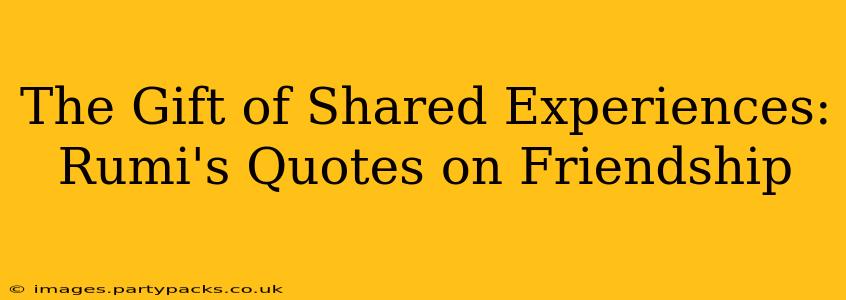The 13th-century Persian poet and Sufi mystic, Rumi, penned verses that continue to resonate with readers across centuries. His wisdom extends beyond spiritual matters, touching upon the profound significance of human connection, particularly friendship. Rumi's quotes on friendship offer a rich tapestry of insight into the nature of true companionship, highlighting its transformative power and the enduring value of shared experiences. This exploration delves into Rumi's perspective, examining his words to understand the depth of his message regarding friendship.
What are some of Rumi's most famous quotes about friendship?
Many of Rumi’s quotes on friendship are not explicitly labeled as such, but rather woven into the larger context of his poems and spiritual teachings. However, several passages powerfully capture the essence of friendship as he understood it. While pinpointing the most famous is subjective and depends on individual interpretation, some frequently cited passages highlight the importance of shared joy, mutual support, and the spiritual growth fostered through deep connection. These often emphasize the mirroring effect friends have on each other, reflecting back aspects of the self that might otherwise remain unseen.
How does Rumi define true friendship?
Rumi doesn't offer a concise, dictionary-like definition of true friendship. Instead, he illustrates it through metaphors and imagery. For Rumi, true friendship transcends superficiality. It involves a deep understanding, a shared journey of growth, and a willingness to support each other through life's ups and downs. It's about seeing beyond the surface, recognizing the divine spark within one's friend, and celebrating that spark as one's own. This recognition leads to a bond that's not simply social but profoundly spiritual.
What is the role of shared experiences in Rumi's concept of friendship?
Shared experiences form the bedrock of Rumi's concept of friendship. The joy, sorrows, struggles, and triumphs experienced together forge an unbreakable bond. These shared moments are not merely memories; they are the building blocks of a relationship built on mutual vulnerability and understanding. The deeper the shared experiences, the stronger the connection, creating a bond that deepens over time, much like a fine wine.
What are the benefits of friendship according to Rumi?
Rumi's perspective on the benefits of friendship is multifaceted. He saw friendship as a catalyst for spiritual growth, a mirror reflecting one's own soul, and a source of immense joy and support. True friendship, in Rumi's eyes, isn't just pleasant company; it’s a pathway to self-discovery and a richer, more meaningful life. The companionship offers solace, encourages self-reflection, and fosters a sense of belonging and purpose. It provides a safe space for vulnerability and allows for the expression of one's authentic self without fear of judgment.
How does Rumi's view on friendship differ from modern perspectives?
While modern perspectives on friendship often emphasize convenience and shared interests, Rumi's view is more profound and spiritually oriented. While shared interests certainly play a role, Rumi's focus lies on the transformative power of deep connection and mutual spiritual growth. He emphasizes the role of friendship in fostering self-awareness and the realization of one's own spiritual potential. Modern society, often focused on individual achievement, may overlook the transformative potential of deeply meaningful friendships, a perspective that Rumi's poetry powerfully counters.
How can we apply Rumi's wisdom on friendship to our own lives?
Applying Rumi’s wisdom to our lives involves cultivating genuine connections based on mutual respect, understanding, and shared experiences. It encourages us to seek out friendships that nurture our spiritual growth and challenge us to become better versions of ourselves. This means actively listening to our friends, offering genuine support, and being present in our relationships. It means embracing vulnerability and allowing ourselves to be seen for who we truly are. It also means actively creating opportunities for shared experiences – celebrating triumphs, offering comfort during struggles, and cherishing the moments of shared joy. By embracing these principles, we can cultivate the kind of deep, meaningful friendships Rumi so eloquently celebrated.
This exploration offers a glimpse into the profound wisdom of Rumi’s perspective on friendship. His words offer a timeless guide to cultivating meaningful connections and appreciating the invaluable gift of shared experiences. The true essence of friendship, according to Rumi, lies in the mutual growth, shared joy, and deep spiritual connection fostered through a genuine and vulnerable bond.

